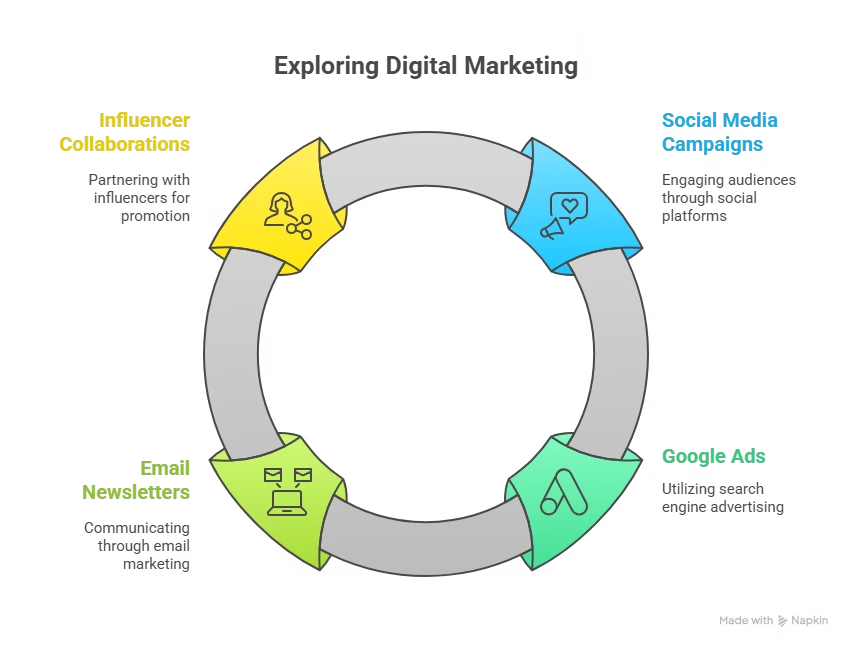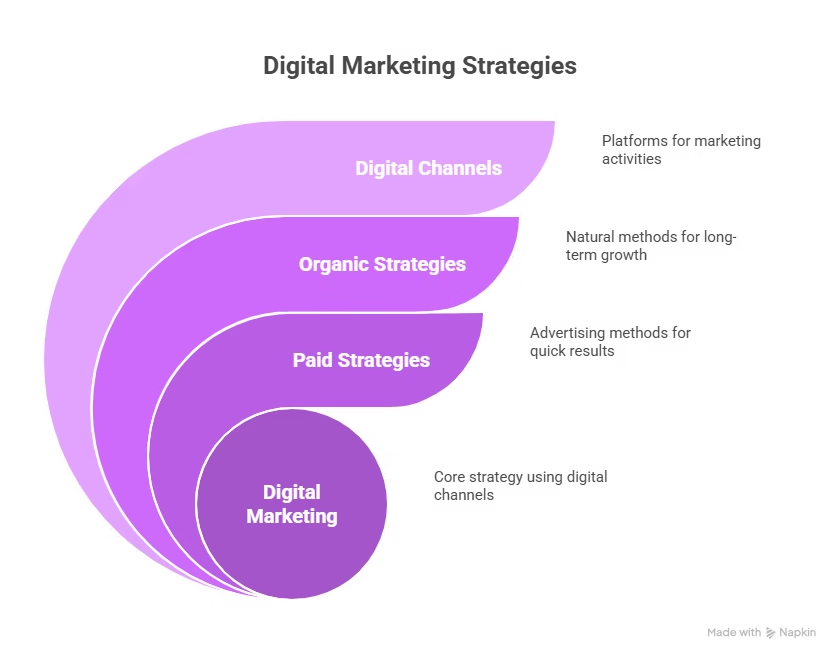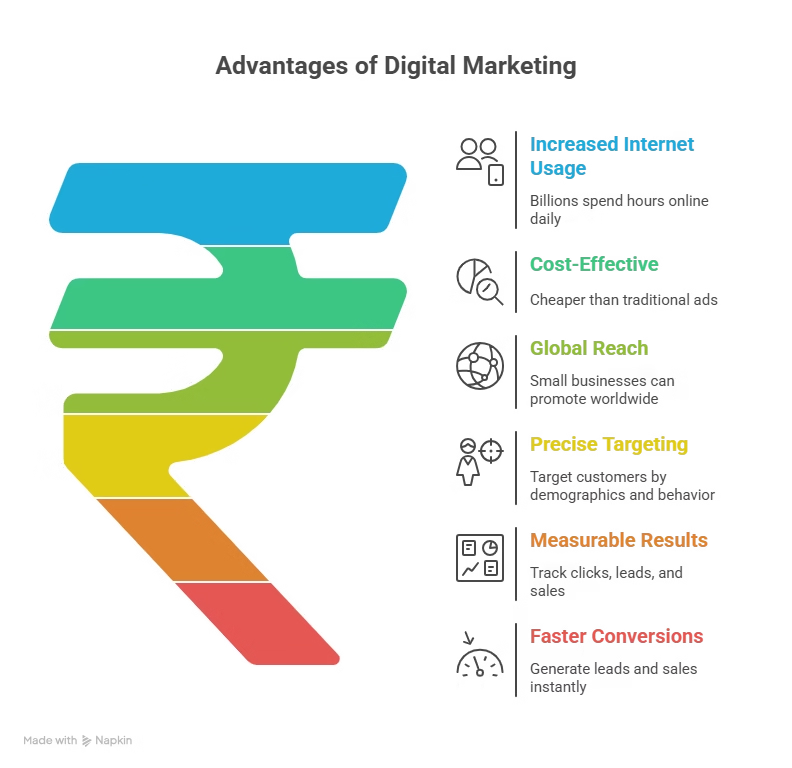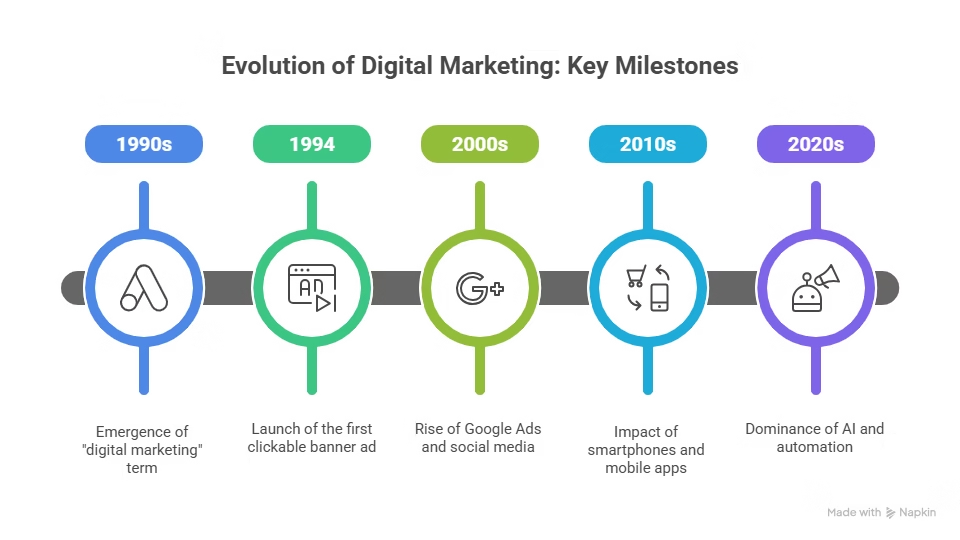In today’s interconnected world, where almost everything is moving online, businesses can no longer rely solely on traditional marketing methods like newspapers, television, or radio. While these methods still hold value, they have certain limitations, such as geographical restrictions, high costs, and limited tracking.
Digital Marketing—a modern, technology-driven way of promoting products and services using the internet and digital platforms. From social media campaigns to Google ads, from email newsletters to influencer collaborations, digital marketing has revolutionized the way companies connect with their target audience.
This article will take you through a comprehensive 3000-word explanation of what digital marketing is, how it works, its various types, benefits, challenges, tools, career opportunities, and its future potential.

Definition of Digital Marketing
Digital Marketing refers to the promotion of products, services, or brands using digital channels such as search engines, social media, email, websites, and mobile apps.
In simple words:
👉 Digital Marketing = Marketing done using the internet and digital technologies.
It involves both paid (like Google Ads, Facebook Ads) and organic (like SEO, content marketing) strategies to reach, engage, and convert customers.

Why is Digital Marketing Important?
The importance of digital marketing can be understood from these points:
Increased Internet Usage – Billions of people spend hours on smartphones and laptops daily.
Cost-Effective – Digital ads are cheaper compared to traditional TV or newspaper ads.
Global Reach – Even a small business in a village can promote its product worldwide.
Precise Targeting – Businesses can target customers by age, gender, location, interest, and behavior.
Measurable Results – Every click, lead, and sale can be tracked.
Faster Conversions – With paid ads, businesses can generate leads and sales instantly.

A Brief History of Digital Marketing
1990s: The term “digital marketing” first appeared. Early search engines like Yahoo and Google changed the game.
1994: The first clickable banner ad was launched.
2000s: With the rise of Google Ads and social media platforms like Facebook, Twitter, and LinkedIn, digital marketing exploded.
2010s: Smartphones, mobile apps, Instagram, and YouTube changed consumer behavior drastically.
2020s: AI, automation, chatbots, and personalized marketing dominate the digital space.

Types of Digital Marketing
Digital marketing is a broad field with multiple strategies and channels.
1. Search Engine Optimization (SEO)
SEO means optimizing a website to rank higher on search engines like Google.
- On-Page SEO: Optimizing content, keywords, titles, and meta descriptions.2.
- Off-Page SEO: Backlinks, guest blogging, and social signals.3.
- Technical SEO: Website speed, mobile-friendliness, and crawlability.
2. Search Engine Marketing (SEM) / Pay-Per-Click (PPC)
Paid ads on search engines where businesses pay only when someone clicks. Example: Google Ads.
3. Social Media Marketing (SMM)
Using platforms like Facebook, Instagram, LinkedIn, YouTube, and Twitter to promote brands.
Organic Marketing: Growing followers naturally.
Paid Marketing: Running targeted ads.
4. Content Marketing
Creating valuable content to attract and engage an audience.
Blogs
Videos
Infographics
eBooks and guides
Podcasts
5. Email Marketing
Sending promotional and relationship-building messages to customers’ inboxes. Still one of the highest ROI methods.
6. Mobile Marketing
Marketing via SMS, WhatsApp, push notifications, and mobile apps.
7. Affiliate Marketing
Earning commission by promoting other companies’ products. Example: Amazon Affiliate Program.
8. Influencer Marketing
Partnering with social media influencers to reach their audience.
9. Video Marketing
Promoting products and services through platforms like YouTube, Instagram Reels, and TikTok.
Benefits of Digital Marketing
Cost-Effective – Affordable compared to traditional marketing.
Global Reach – Access customers worldwide.
Targeted Advertising – Focus on the right audience.
High ROI – Better return on investment.
Measurable – Data-driven decisions through analytics.
Faster Conversions – Leads can turn into sales quickly.
Brand Building – Helps build credibility and trust.
Limitations / Challenges of Digital Marketing
High Competition – Every business is online now.
Constantly Changing Algorithms – Search engines and social platforms update frequently.
Cybersecurity Risks – Data privacy concerns.
Technical Knowledge Required – Need skills in SEO, ads, analytics, etc.
Customer Trust Issues – Fake news, scams, and misleading ads create doubts.
How Does Digital Marketing Work?
The process generally includes:
Audience Research – Understanding the target market.
Content Creation – Creating blogs, videos, ads, or posts.
Choosing Channels – SEO, ads, social media, email, etc.
Execution – Running campaigns.
Tracking Results – Using analytics tools.
Optimization – Improving based on data.
Essential Skills for Digital Marketers
SEO and SEM knowledge
Social media management
Copywriting and content creation
Graphic design and video editing
Email marketing strategies
Data analysis and Google Analytics
Communication and sales skills
Career Opportunities in Digital Marketing
Digital marketing offers huge career opportunities worldwide:
SEO Specialist
PPC Expert
Social Media Manager
Content Marketer
Email Marketing Specialist
Digital Marketing Manager
Influencer/Brand Manager
Freelancer or Agency Owner
Salaries range from $5,000/year for beginners to $100,000+ for experienced professionals in developed countries.
Popular Digital Marketing Tools
Google Analytics – For website tracking
Google Ads – Paid advertising
Ahrefs / SEMrush – SEO tools
Canva – Graphic designing
Mailchimp – Email marketing
Hootsuite / Buffer – Social media scheduling
Facebook Ads Manager – Social media ads
Future of Digital Marketing
The future is extremely bright:
AI & Automation – Personalized campaigns at scale.
Voice Search – Optimizing for Alexa, Siri, Google Assistant.
Chatbots – Instant customer support.
Short-form Video – Reels, Shorts, TikTok dominating.
AR/VR Marketing – Virtual shopping experiences.
Personalization – Hyper-targeted ads and offers.
Conclusion
Digital marketing is no longer optional—it is essential for every business, small or large, local or global. It provides a cost-effective, measurable, and powerful way to connect with customers.


In short:
Digital Marketing = Smart Marketing + Global Reach + High ROI + Future Growth

